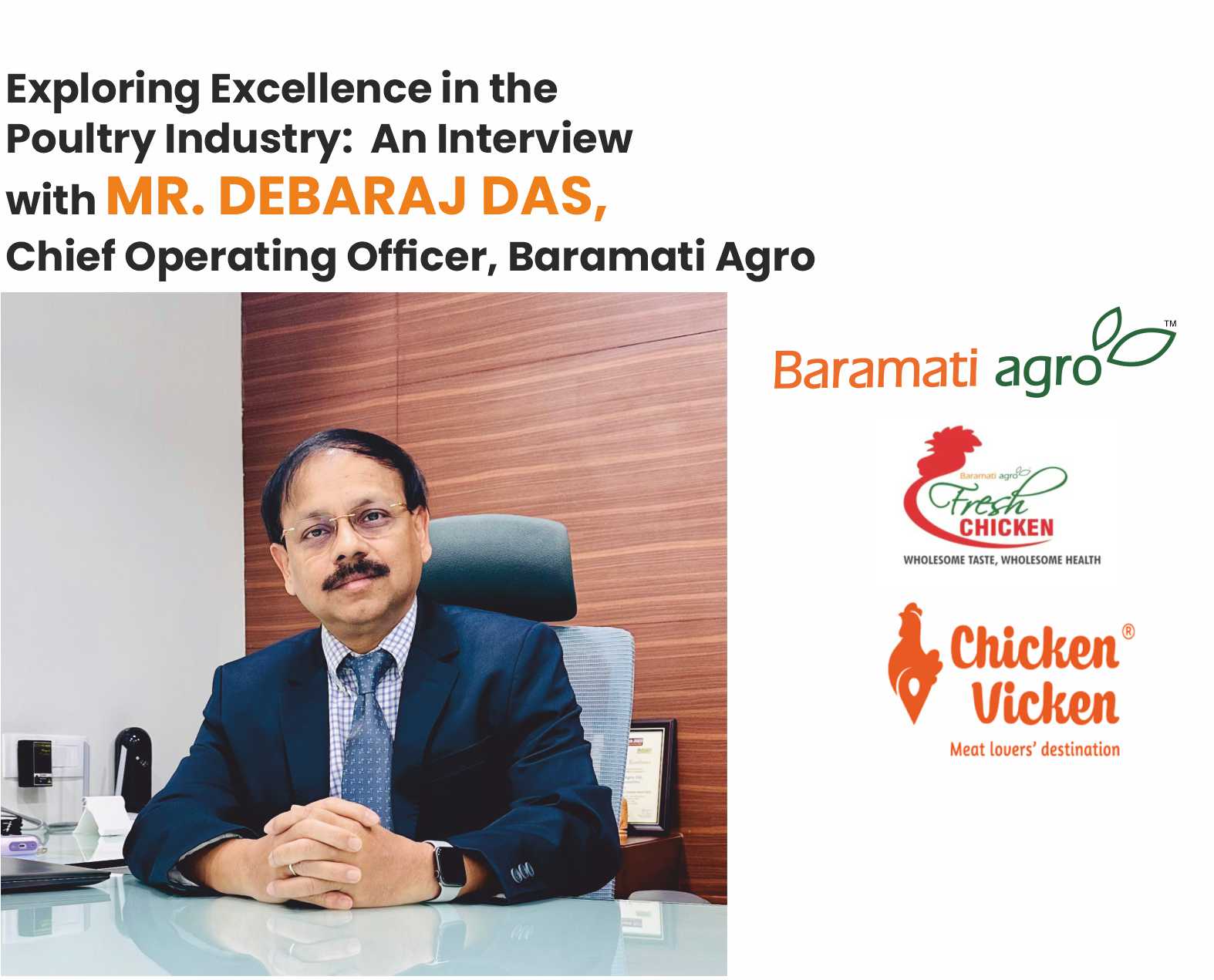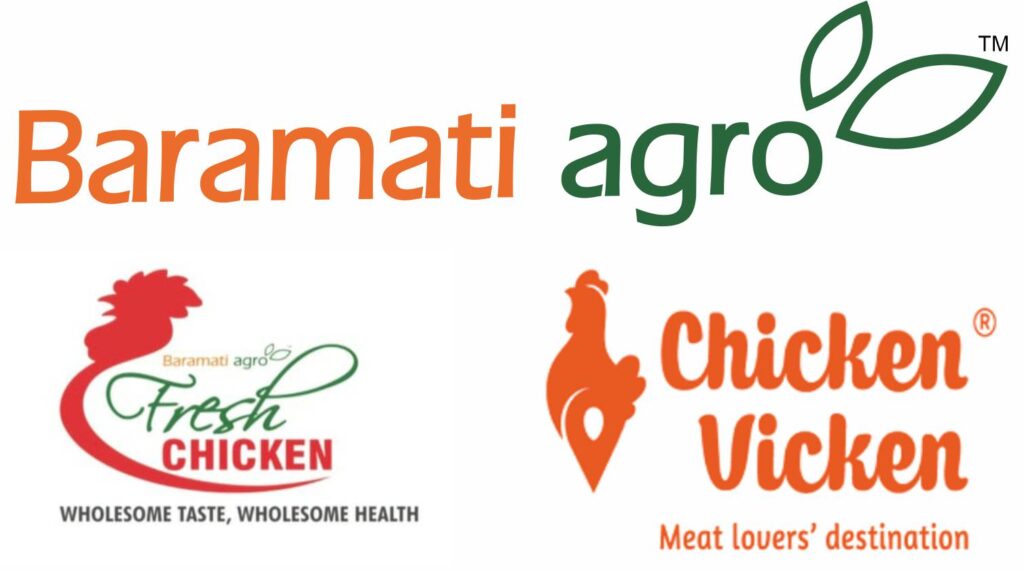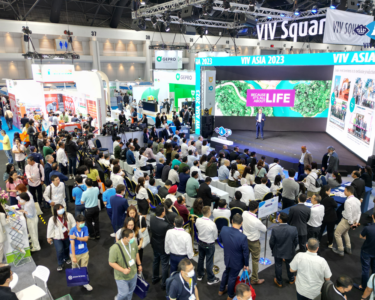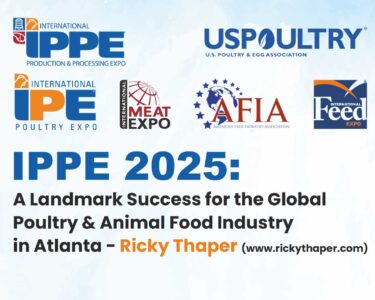Exploring Excellence in the Poultry Industry:
An Interview with MR. DEBARAJ DAS
CHIEF OPERATING OFFICER, BARAMATI AGRO
The sustainability of the industry is possible when there is a balance between the raw material cost and live birds’ selling price. The government should think about raw material price control for the feed industry and/or allow the import of grains and other raw materials for specific use in the feed industry.
Poultry Creations: Mr. Das, could you please provide a brief overview of your background and role within Baramati Agro? How did you become involved with the company, and what responsibilities do you hold in shaping the company’s strategies, innovations, and overall direction in the poultry industry? Additionally, could you share insights into how your leadership has contributed to the company’s growth?
Debaraj Das : Contrary to the general perception, I don’t come with prior experiences in the poultry industry. I am a Mechanical Engineering graduate with an M.Tech in Aeronautical Engineering from IIT, Chennai and an MBA from Kelley School of Business, Indiana University, USA. I started my career in Defence Aerospace PSU and later moved to Automotive, Industrial Safety, and Medical Device Businesses with some of the leading MNCs. Over three decades, I worked in various leadership roles managing multiple business verticals in cross-cultural setups.
I got introduced to Baramati Agro Ltd after the first phase of the COVID-19 pandemic was over and joined the company in early 2021 taking business responsibility for the Poultry (Breeder and Broiler Integration), Animal Feed, Food, and Fruits & Vegetables Divisions. The VUCA World (Volatility, Uncertainty, Complexity, and Ambiguity) aptly defines the Poultry Industry.
In line with the vision of our company “to be a value-based company with a leadership role in domestic as well as international markets….” and with the mission to “scale up with the speed to become India’s largest diversified agribusiness conglomerate”, I am involved in our strategic business growth and execution.
It is not always easy than said. Having come from a diverse background, I always focus on visionary and transformational leadership. A strong foundation with the right people having capability, flexibility, and adaptability is the key to success.
Poultry Creations: Mr. Das, Baramati Agro’s journey in the poultry industry spans over three decades. Could you share the pivotal moments that have shaped the company’s evolution and its reputation as a trailblazer in the industry?
Debaraj Das : Our CEO, Mr. Rohit Pawar, is a highly visionary leader. Under his leadership, the company has grown multi-fold over the last decade. With a humble beginning with the poultry integration, today our business is highly diversified. “Linking the basics” has been the motto of the company and that has helped us to connect at both ends of the business – the farmers at one end and the consumers at the other end. With a farm-to-fork model, we focus on value creation throughout the supply chain process, thereby making the lives of the people better. Uncompromised quality and service have helped us to earn a reputation of what Baramati Agro is today. Farmers to customers, all can depend on us.
Poultry Creations: The slogan “We know our chicken because we grow our chicken” underlines Baramati Agro’s commitment to quality. Could you explain how this integrated approach, encompassing parent farms, feed mills, and processing, ensures the superior quality of your products?
Debaraj Das: Who better knows about our chicken than we do? While this is true for all our competitors, what differentiates us is that once we make a promise, we keep our promise. Our irrefutable quality of live chicken under our “Baramati Agro Fresh Chicken” brand and chilled chicken through our “Chicken Vicken” franchisees are testimony to this statement. There is no compromise on quality assurance and quality control at every step of the business processes from parent farms to feed milling, broiler integration, and chicken processing. We follow some of the best practices not only from the poultry industry but also from other industries which are adapted to suit our requirements. Together with this, we have strong IT systems integrated with SAP. We focus on IOT to make our system foolproof.
Poultry Creations: Maintaining precise process parameters at various stages is essential for quality control. How does Baramati Agro ensure this control across different operations, and what technologies or methodologies have contributed to consistent excellence?
Debaraj Das : I spoke about it earlier. We are constantly in touch with our suppliers and technology providers to understand recent developments in products and technologies that can help us improve our process efficiencies and effectiveness. We have an appetite for quickly adopting new products and technologies to leverage the benefits. Small improvements lead to big gains. Our SOPs are dynamic and keep changing with evolving technologies.
Poultry Creations: With a substantial number of laying parent birds and a hatching capacity, how do you ensure both productivity and the well-being of the birds under your care?
Debaraj Das : There is no shortcut in our poultry integration, and hence no comprise is allowed in following the SOPs. Identifying the risks well in advance and taking appropriate actions are core to success. In addition to this, we have our in-house quality department who work independently and report their findings to avoid any bias in reporting. Frequent periodic audit by experts also helps us to identify the gaps and helps us follow the industry’s best practices. This ensures not only the productivity but also the health of the birds at the broiler level through effective management practices of parents and hatcheries.
Poultry Creations: Baramati Agro’s influence on farmers in Maharashtra is commendable. Could you share a specific success story or an example of how your support has positively transformed a farmer’s life and their farming practices?
Debaraj Das: Our vision is to create value for all stakeholders by Linking the Basics. Transforming the lives of the farmers has been our motto. We have relentlessly worked on the socio-economic growth of the farmers bringing smiles to their faces. Our technical team works hand in hand with the farmers in training and deploying the best farming techniques and management practices. Educating the farmers in farm management has resulted in improving their earnings and establishing a long-term relationship.
Poultry Creations: Providing day-old chicks and comprehensive support to farmers requires careful coordination. How do you manage to ensure a consistent supply of resources and support to a diverse network of farmers?
Debaraj Das: We have a decentralized system to provide necessary service support to the farmers across all locations. Our team at each location is trained in the business processes. At the same time, we have an established common system, process, and practice which are followed at all locations. Every location is connected through our integrated IT system and is centrally monitored for any variances or deviations. This helps us to take timely actions for mitigation of any issues and further improvements.
Poultry Creations: The concept of providing chicks to farmers and taking back mature birds for processing is innovative. How has this cycle influenced the growth of Baramati Agro and contributed to the economic stability of the farmers?
Debaraj Das: This process limits the liability of the farmer. From a farmer’s point of view, there is no working capital issue in managing the farm other than the labourer/supervision for farm management. The cost is borne by us and the farmers earn the growing charges with the potential to earn higher than the minimum with better bird performance. Hence, the farmers are not worried about the quality and cost of the chicks or the burden of selling the matured birds. Further, they are protected from fluctuating live bird prices. Thus, irrespective of the business performance, the farmers continue to earn which ensures their economic stability.
Poultry Creations: Mr. Das, effectively marketing and promoting poultry products can be crucial in capturing consumer attention and fostering brand loyalty. Could you share Baramati Agro’s strategies for promoting your range of poultry products? How does the company differentiate itself in a competitive market and communicate the unique value propositions of its products to consumers? Additionally, could you highlight any innovative marketing campaigns or approaches that have significantly contributed to enhancing consumer engagement and driving sales growth?
Debaraj Das: Baramati Agro ‘Fresh Chicken’ brand for Live Birds’ stores has earned a reputation over the years for delivering superior quality birds. We never compromise on the quality at any step in our poultry integration. We have the reputation of providing birds of a certain age and size irrespective of how the market behaves. This has earned us this unique reputation of “Baramati Agro Fresh Chicken”. Needless to say, customers today demand Baramati Agro chicken in live bird retail stores. If some live bird stores at the far-off Murshidabad boost our logo (copied), then you can probably think that people in India are talking about our birds because of their uniqueness. We promise to deliver soft and tender chicken and we do it every time. We were the first to communicate to the people about the benefits of eating chicken to boost their protein and immunity during the COVID-19 pandemic. Our FM radio and TV commercials helped to deliver the messages to the people.
Poultry Creations: The “elicious” brand and your range of value-added chicken products are gaining recognition. How does Baramati Agro’s Product Innovation Center contribute to the creation of these products, and could you share a notable example of successful innovation?
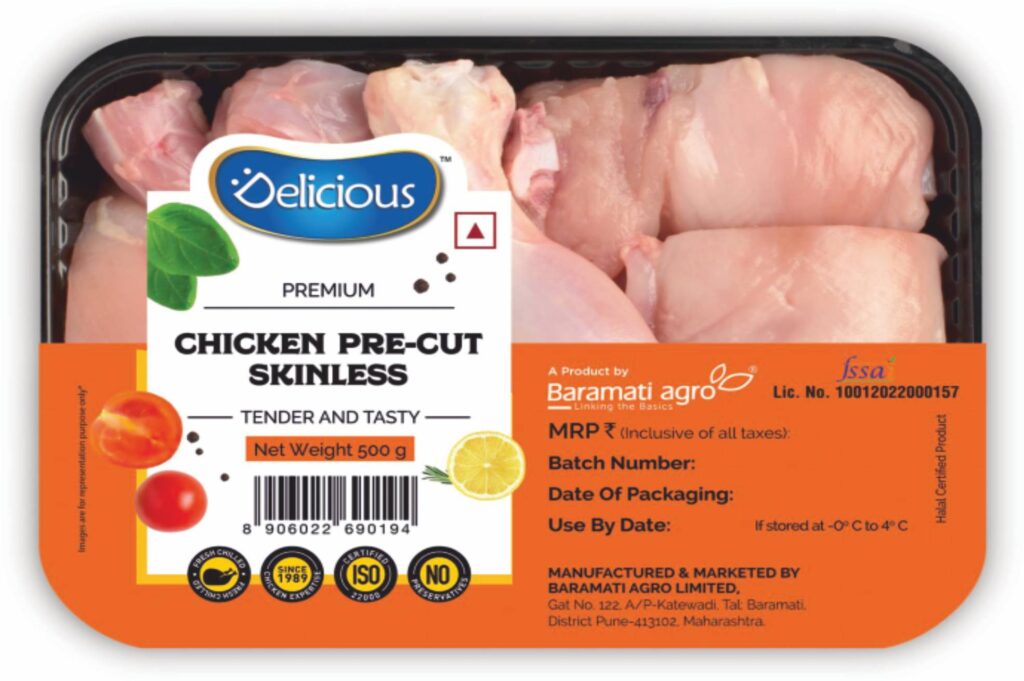
Debaraj Das: Our ‘elicious’ brand has earned a name in the frozen value-added product category. We constantly evolve with innovative recipes and products to suit the varied consumer preferences in India. Some of our products such as chicken sausages are the highest selling products, which amply testifies our innovative products and the quality thereof.
Poultry Creations: The presence of “Chicken Vicken” outlets seems to create a direct link with consumers. How do these outlets contribute to enhancing consumer experience and promoting farm-fresh products?
Debaraj Das: Our Chicken Vicken outlets are meant to create a customer experience in buying the so-called commodity product ‘chicken’. We promise a clean and hygienic store delivering soft, juicy, tender, and fibreless chicken. Customers don’t get the experience of the wet market, but rather the experience of a store where you can come with your family. Our customers are our promoters. The best testimony comes when you suddenly switch from Chicken Vicken to other stores to buy the chicken and your kids tell you that this chicken is different, and it is not good. You know what I mean. Enhanced customer experience comes when they see value in buying from the Chicken Vicken stores.
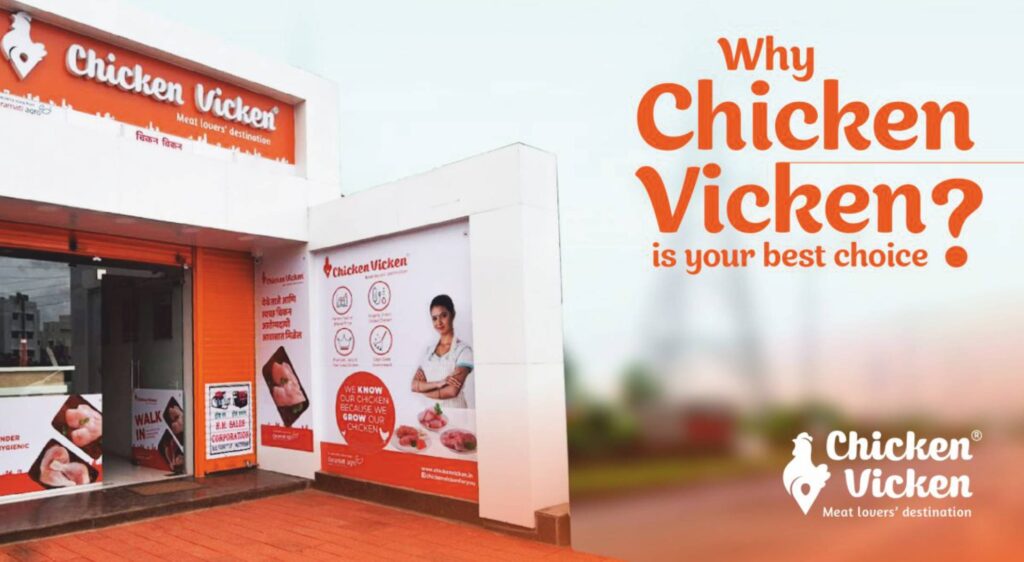
Poultry Creations: Mr. Das, government support and policies can play a crucial role in the growth and sustainability of the poultry industry. what kind of further support or changes in government policy would you recommend to further boost the industry’s progress and ensure its long-term viability?
Debaraj Das: It is a known fact that in the poultry industry, the volatility of live bird rates coupled with the volatility in raw material prices are impacting the industry in a big way. While the raw material prices are constantly on an upward trend, the live bird rates are almost stagnant. This trend has been on for the last few years and is constantly putting pressure on the poultry industry to survive. The sustainability of the industry is possible when there is a balance between the raw material cost and live birds’ selling price. The government should think about raw material price control for the feed industry and/or allow the import of grains and other raw materials for specific use in the feed industry.
Poultry Creations: Mr. Das, the cost of raw materials, particularly feed ingredients, can significantly impact the profitability of poultry production. How does Baramati Agro manage and mitigate the challenges posed by fluctuations in raw material prices? Are there strategies in place to optimize feed formulation, explore alternative sourcing, or employ risk management approaches to ensure cost stability while maintaining product quality?
Debaraj Das: This is the sad part. While the live bird price is not in your control, you see a constant upward movement in the prices of feed ingredients. Ironically, this burden is not faced by the farmers and traders of broilers, nor by the feed raw materials, supplements, additives, medicines, and vaccine suppliers. The whole of this burden comes on the integrators. There is a limit to optimise feed formulation or use of alternate raw materials. I think these options are also slowly reaching the saturation point. You cannot compromise on the bird’s performance or quality. Beyond a certain limit, you cannot do anything. Hence, the profitability will always remain a challenge.
Poultry Creations: Dear Mr. Das, as we’ve recently launched the new magazine “Poultry Creations,” we are keen on conveying a meaningful message to the poultry industry. Considering your expertise, what key message would you recommend we communicate through our magazine to best serve and resonate with the industry?
Debaraj Das: First of all, Congratulations on the successful launch of “Poultry Creations” Magazine! and I wish all the very best and success to the magazine. My suggestions will be to promote knowledge through the magazine for the industry to gain and utilise. The industry must be well aware of the latest developments in processes, technologies, methods, and practices. Imbibing Industry 4.0 for a digital transformation will be key to taking the poultry industry upward and positioning it in the industrial map of India.


